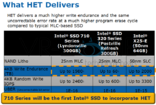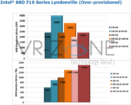- Joined
- Oct 9, 2007
- Messages
- 47,243 (7.55/day)
- Location
- Hyderabad, India
| System Name | RBMK-1000 |
|---|---|
| Processor | AMD Ryzen 7 5700G |
| Motherboard | ASUS ROG Strix B450-E Gaming |
| Cooling | DeepCool Gammax L240 V2 |
| Memory | 2x 8GB G.Skill Sniper X |
| Video Card(s) | Palit GeForce RTX 2080 SUPER GameRock |
| Storage | Western Digital Black NVMe 512GB |
| Display(s) | BenQ 1440p 60 Hz 27-inch |
| Case | Corsair Carbide 100R |
| Audio Device(s) | ASUS SupremeFX S1220A |
| Power Supply | Cooler Master MWE Gold 650W |
| Mouse | ASUS ROG Strix Impact |
| Keyboard | Gamdias Hermes E2 |
| Software | Windows 11 Pro |
In the weeks to come, Intel will unveil a new family of solid state drives, the SSD 710 series, codenamed "Lyndonville". These come in the 2.5-inch form-factor, and use the 3 Gb/s SATA interface. Intel is pitching SSD 710 series to the enterprise computing segment, as a potential successor of even the X25-E series. Its design principles include giving the enterprise segment an SSD with lower price per gigabyte and endurance comparable to X25-E. Intel is able to achieve lower price per gigabyte because it is using High Endurance Technology Multi-Level Cell (HET-MLC) NAND flash memory chips built on the 25 nanometer fabrication proces, and not 50 nm SLC NAND flash.
Intel's SSD 710 series are available in three capacities - 100 GB, 200 GB, and 300 GB. The endurance rating, 4 KB and 8 KB random read/write performance, and even sequential transfer rates vary between the three. Endurance and performance are also affected by overprovisioning. The drives can be set provide its maximum advertised unformatted capacity, or 20% of it can be overprovisioned. The SSD 710 drives provide up to 1,500 TB 4 KB random write endurance, and up to 2,400 IOPS 4 KB random write performance.



In terms of sequential transfer rates, the three SSD 710 models offer 270 MB/s sequential read speed. The 100 GB variant sequentially writes at speeds of up to 170 MB/s, while the 200 GB and 300 GB ones sequentially write at up to 210 MB/s. In terms of 4 KB write endurance, the 100 GB model offers 500 TB (900 TB with 20% overprovisioning), the 200 GB model offers 1000 TB endurance (1500 PB with 20% overprovisioning), while the 300 GB model tops the charts with 1100 TB endurance (3000 TB with 20% overprovisioning). What it means for datacenters and hosting companies is that they can offer higher capacity of SSD storage on their leased servers. Intel's SSD 710 series will be released by mid-September.
View at TechPowerUp Main Site
Intel's SSD 710 series are available in three capacities - 100 GB, 200 GB, and 300 GB. The endurance rating, 4 KB and 8 KB random read/write performance, and even sequential transfer rates vary between the three. Endurance and performance are also affected by overprovisioning. The drives can be set provide its maximum advertised unformatted capacity, or 20% of it can be overprovisioned. The SSD 710 drives provide up to 1,500 TB 4 KB random write endurance, and up to 2,400 IOPS 4 KB random write performance.



In terms of sequential transfer rates, the three SSD 710 models offer 270 MB/s sequential read speed. The 100 GB variant sequentially writes at speeds of up to 170 MB/s, while the 200 GB and 300 GB ones sequentially write at up to 210 MB/s. In terms of 4 KB write endurance, the 100 GB model offers 500 TB (900 TB with 20% overprovisioning), the 200 GB model offers 1000 TB endurance (1500 PB with 20% overprovisioning), while the 300 GB model tops the charts with 1100 TB endurance (3000 TB with 20% overprovisioning). What it means for datacenters and hosting companies is that they can offer higher capacity of SSD storage on their leased servers. Intel's SSD 710 series will be released by mid-September.
View at TechPowerUp Main Site


